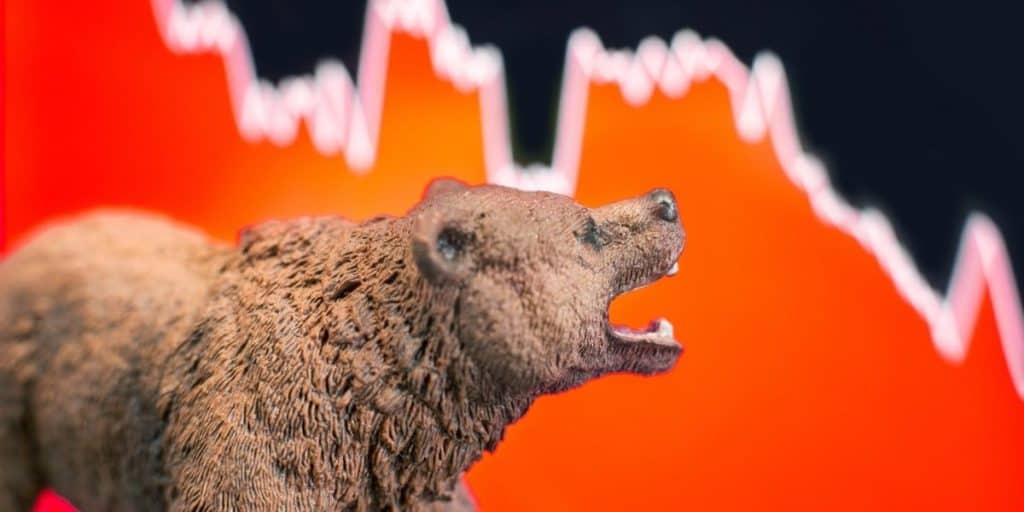Robo advisors have grown in popularity over the last few years. They offer investors well-researched advice at very affordable costs. However, many people are wary about their operations—especially how they’re likely to perform in a bear market.
Robo advisors can survive a bear market if they have a healthy pool of clients who don’t liquidate their holdings during this period. Panic-driven withdrawals can make sustainability difficult for the brands. In terms of results, Robo advisors don’t fare any worse than hedge funds in a bear market.
The rest of this article will look at why Robo advisor companies are likely to survive a bear market. But first, let us learn the meaning of a bear market.
IMPORTANT SIDENOTE: I surveyed 1500+ traders to understand how social trading impacted their trading outcomes. The results shocked my belief system! Read my latest article: ‘Exploring Social Trading: Community, Profit, and Collaboration’ for my in-depth findings through the data collected from this survey!
Table of Contents
What Is a Bear Market?
A bear market refers to a period of general and extended drop all across the investment world. It begins when prices have dropped by 20% or more from the recent highs. Bear markets can affect the entire stock market or individual stocks.

In many cases, bear markets do not end at a 20% drawdown. The downturn will usually go deeper than that, even amid so-called relief rallies. The bear market ends when investor confidence has returned to the market, and the market edges upwards to print new highs.
Investors are pessimistic and low on confidence in bear markets. They are likely to ignore any bit of good news to continue selling their investments, pushing prices even lower.
Several factors come together to cause a bear market. If key economic indicators are blinking red, investors will take it as a cue of impending economic downturn. Unexpected situations like the COVID-19 pandemic can also trigger a bear market.
However, bear markets tend to be short-lived compared to bull markets (which is the opposite). According to data from Invesco, bear markets last for 363 days on average, while bull markets last for 1,742 days. The depth of a bear market also pales compared to the overall experience in a bull market with average losses of 33% and average gains of 159%, respectively.
How Robo Advisors Will Fare in a Bear Market?
It’s unclear how Robo advisors will fare in a prolonged bear market. Since they became popular, the early days of the COVID-19 pandemic was the first major bear market we’ve witnessed.
However, the bear market was short-lived as the recovery followed within a few months after the drawdown recorded in March 2020. For example, the S&P 500 fell 33% in a few short weeks between February and March 2020 but returned to new highs by August 2020.
Generated Returns
The returns recorded by Robo advisors were no worse than those recorded by mutual funds and other index-tracking vehicles. This report by Back End Benchmarking captured the overall performance of Robo advisors during the peak of the COVID-19 drawdown. Most of the advisors analyzed had a smaller loss than the 33% recorded by the S&P 500.
So, in terms of results, Robo advisors won’t perform any worse than conventional advisors in a bear market.
Overall Sustainability
Will Robo advisor companies go bust in a bear market? There’s no straightforward answer to this as it depends on a few factors. Many investors will redeem their investments en masse in the event of a bear market in fear of a continued decline.
However, this isn’t a risk that’s peculiar to Robo advisor companies. Any wealth management company will lose clients in a bear market.
Depending on the size of the redemptions, a Robo advisor company may struggle with revenues in a bear market. If the downturn lingers for years, some of these companies may indeed go under. The biggest ones with tens of billions under management will largely come through this period unscathed.
The smaller brands unable to continue powering their operations may be acquired.
Robo Advisors in a Bear Market: The Case Against Mass Redemptions
There’s an argument that more people will hand over their investing to Robo advisors in a downturn instead of redeeming their investments. People who were burnt investing in less diversified portfolios are likely to seek the low-cost solution offered by Robo advisors in an attempt to prevent a repeat of the investment mistakes.
Bear markets often provide an opportunity for introspection amongst investors. Many people overestimate their ability to read the market, often assuming that they can time their entrance and exit. It often takes a bear market to remind such investors of their limitations. In that situation, they’re likely to seek the opinion of professionals.
The average investor can’t afford to pay these professionals, hence the move towards Robo advisors.
With an influx of new customers balancing out the investors redeeming their investments, Robo advisors have a good chance of riding out a bear market without any problems.
How To Utilize Robo Advisors in a Bear Market?
To increase your chances of success in a bear market when using Robo advisors, here’s what you should do:
Embrace Dollar-Cost Averaging
Investors make the mistake of trying to call a bottom in a bear market in a bid to buy the dip. As we mentioned above, a 20% drawdown can easily dip even further to 35%. Calling a bottom at 20% will leave you in an extra 15% loss that you could have avoided.
A better approach would be to regularly add more money to your portfolio using dollar-cost averaging or similar approaches. It’s the perfect way to smooth out your purchased price and ensure you’re not risking too much money when the asset is at value extremes.
Use Reserve Cash To Buy Back the Drawdown
If you’ve chosen an excellent Robo advisor, every significant drawdown is an opportunity for you to make more money when the market inevitably recovers. You can keep a specified portion of your investment pot, split it to invest as specific drawdown levels. For example, you can split the sum into four places and invest a portion with every 10% dip in price.
When the bear market ends and the portfolio heads to new highs, you’ll have more returns compared to investors that just waited out the dip.
Ignore the Short Term
If you panicked and sold your investments in March 2020, believing that we were about to witness a sustained bear market, you’d have missed out on the almost immediate recovery. The best investors always keep their eyes on the big picture.
Once you’ve chosen a diversified portfolio, you’re bound to generate more returns ignoring bear markets when they hit compared to another investor that tries to call the market’s direction.
Remember, bull markets are always more powerful than bear markets. Also, since the average duration of a bear market is more than 300% shorter than bull market duration, you’re almost guaranteed to come out in the green by simply sitting on your hands.
Invest in Index Funds in Recession-Proof Sectors
Sectors like consumer staples and utilities remain stable even during recessions. Including index funds in this sector is a great way to cushion the impact of bear markets when they hit.
Remember, index funds offer more diversification than betting the house on one stock. The best Robo advisors excel at helping you find these funds.
Author’s Recommendations: Top Trading and Investment Resources To Consider
Before concluding this article, I wanted to share few trading and investment resources that I have vetted, with the help of 50+ consistently profitable traders, for you. I am confident that you will greatly benefit in your trading journey by considering one or more of these resources.
- Roadmap to Becoming a Consistently Profitable Trader: I surveyed 5000+ traders (and interviewed 50+ profitable traders) to create the best possible step by step trading guide for you. Read my article: ‘7 Proven Steps To Profitable Trading’ to learn about my findings from surveying 5000+ traders, and to learn how these learnings can be leveraged to your advantage.
- Best Broker For Trading Success: I reviewed 15+ brokers and discussed my findings with 50+ consistently profitable traders. Post all that assessment, the best all round broker that our collective minds picked was M1 Finance. If you are looking to open a brokerage account, choose M1 Finance. You just cannot go wrong with it! Click Here To Sign Up for M1 Finance Today!
- Best Trading Courses You Can Take For Free (or at extremely low cost): I reviewed 30+ trading courses to recommend you the best resource, and found Trading Strategies in Emerging Markets Specialization on Coursera to beat every other course on the market. Plus, if you complete this course within 7 days, it will cost you nothing and will be absolutely free! Click Here To Sign Up Today! (If you don’t find this course valuable, you can cancel anytime within the 7 days trial period and pay nothing.)
- Best Passive Investment Platform For Exponential (Potentially) Returns: By enabling passive investments into a Bitcoin ETF, Acorns gives you the best opportunity to make exponential returns on your passive investments. Plus, Acorns is currently offering a $15 bonus for simply singing up to their platform – so that is one opportunity you don’t want to miss! (assuming you are interested in this platform). Click Here To Get $15 Bonus By Signing Up For Acorns Today! (It will take you less than 5 mins to sign up, and it is totally worth it.)

Conclusion
Robo advisors can survive a bear market as long as the company originally had a healthy base.
Their returns will be no worse than numbers posted by conventional funds. Similarly, the number of customers quitting their investment will likely be countered by new clients looking for a cheap way to get excellent investment advice.
However, the key to success with Robo advisors is to pick the right ones early on and avoid second-guessing them in bear markets. If you choose some of the biggest regulated names in the industry, your money is safe even during a recession.
BEFORE YOU GO: Don’t forget to check out my latest article – ‘Exploring Social Trading: Community, Profit, and Collaboration’. I surveyed 1500+ traders to identify the impact social trading can have on your trading performance, and shared all my findings in this article. No matter where you are in your trading journey today, I am confident that you will find this article helpful!
Affiliate Disclosure: We participate in several affiliate programs and may be compensated if you make a purchase using our referral link, at no additional cost to you. You can, however, trust the integrity of our recommendation. Affiliate programs exist even for products that we are not recommending. We only choose to recommend you the products that we actually believe in.
Recent Posts
Exploring Social Trading: Community, Profit, and Collaboration
Have you ever wondered about the potential of social trading? Well, that curiosity led me on a fascinating journey of surveying over 1500 traders. The aim? To understand if being part of a trading...
Ah, wine investment! A tantalizing topic that piques the curiosity of many. A complex, yet alluring world where passions and profits intertwine. But, is it a good idea? In this article, we'll uncork...
